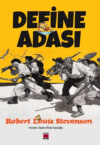Kitabı oku: «New Arabian Nights», sayfa 10
They spoke in tones so low, leaning over the table with every appearance of interest, that Francis could catch no more than a word or two on an occasion. For as little as he heard, he was convinced that the conversation turned upon himself and his own career; several times the name of Scrymgeour reached his ear, for it was easy to distinguish, and still more frequently he fancied he could distinguish the name Francis.
At length the General, as if in a hot anger, broke forth into several violent exclamations.
“Francis Vandeleur!” he cried, accentuating the last word. “Francis Vandeleur, I tell you.”
The Dictator made a movement of his whole body, half affirmative, half contemptuous, but his answer was inaudible to the young man.
Was he the Francis Vandeleur in question? he wondered. Were they discussing the name under which he was to be married? Or was the whole affair a dream and a delusion of his own conceit and self-absorption?
After another interval of inaudible talk, dissension seemed again to arise between the couple underneath the chestnut, and again the General raised his voice angrily so as to be audible to Francis.
“My wife?” he cried. “I have done with my wife for good. I will not hear her name. I am sick of her very name.”
And he swore aloud and beat the table with his fist.
The Dictator appeared, by his gestures, to pacify him after a paternal fashion; and a little after he conducted him to the garden-gate. The pair shook hands affectionately enough; but as soon as the door had closed behind his visitor, John Vandeleur fell into a fit of laughter which sounded unkindly and even devilish in the ears of Francis Scrymgeour.
So another day had passed, and little more learnt. But the young man remembered that the morrow was Tuesday, and promised himself some curious discoveries; all might be well, or all might be ill; he was sure, at least, to glean some curious information, and, perhaps, by good luck, get at the heart of the mystery which surrounded his father and his family.
As the hour of the dinner drew near many preparations were made in the garden of the house with the green blinds. That table which was partly visible to Francis through the chestnut leaves was destined to serve as a sideboard, and carried relays of plates and the materials for salad: the other, which was almost entirely concealed, had been set apart for the diners, and Francis could catch glimpses of white cloth and silver plate.
Mr. Rolles arrived, punctual to the minute; he looked like a man upon his guard, and spoke low and sparingly. The Dictator, on the other hand, appeared to enjoy an unusual flow of spirits; his laugh, which was youthful and pleasant to hear, sounded frequently from the garden; by the modulation and the changes of his voice it was obvious that he told many droll stories and imitated the accents of a variety of different nations; and before he and the young clergyman had finished their vermouth all feeling of distrust was at an end, and they were talking together like a pair of school companions.
At length Miss Vandeleur made her appearance, carrying the soup-tureen. Mr. Rolles ran to offer her assistance which she laughingly refused; and there was an interchange of pleasantries among the trio which seemed to have reference to this primitive manner of waiting by one of the company.
“One is more at one’s ease,” Mr. Vandeleur was heard to declare.
Next moment they were all three in their places, and Francis could see as little as he could hear of what passed. But the dinner seemed to go merrily; there was a perpetual babble of voices and sound of knives and forks below the chestnut; and Francis, who had no more than a roll to gnaw, was affected with envy by the comfort and deliberation of the meal. The party lingered over one dish after another, and then over a delicate dessert, with a bottle of old wine carefully uncorked by the hand of the Dictator himself. As it began to grow dark a lamp was set upon the table and a couple of candles on the sideboard; for the night was perfectly pure, starry, and windless. Light overflowed besides from the door and window in the verandah, so that the garden was fairly illuminated and the leaves twinkled in the darkness.
For perhaps the tenth time Miss Vandeleur entered the house; and on this occasion she returned with the coffee-tray, which she placed upon the sideboard. At the same moment her father rose from his seat.
“The coffee is my province,” Francis heard him say.
And next moment he saw his supposed father standing by the sideboard in the light of the candles.
Talking over his shoulder all the while, Mr. Vandeleur poured out two cups of the brown stimulant, and then, by a rapid act of prestidigitation, emptied the contents of a tiny phial into the smaller of the two. The thing was so swiftly done that even Francis, who looked straight into his face, had hardly time to perceive the movement before it was completed. And next instant, and still laughing, Mr. Vandeleur had turned again towards the table with a cup in either hand.
“Ere we have done with this,” said he, “we may expect our famous Hebrew.”
It would be impossible to depict the confusion and distress of Francis Scrymgeour. He saw foul play going forward before his eyes, and he felt bound to interfere, but knew not how. It might be a mere pleasantry, and then how should he look if he were to offer an unnecessary warning? Or again, if it were serious, the criminal might be his own father, and then how should he not lament if he were to bring ruin on the author of his days? For the first time he became conscious of his own position as a spy. To wait inactive at such a juncture and with such a conflict of sentiments in his bosom was to suffer the most acute torture; he clung to the bars of the shutters, his heart beat fast and with irregularity, and he felt a strong sweat break forth upon his body.
Several minutes passed.
He seemed to perceive the conversation die away and grow less and less in vivacity and volume; but still no sign of any alarming or even notable event.
Suddenly the ring of a glass breaking was followed by a faint and dull sound, as of a person who should have fallen forward with his head upon the table. At the same moment a piercing scream rose from the garden.
“What have you done?” cried Miss Vandeleur. “He is dead!”
The Dictator replied in a violent whisper, so strong and sibilant that every word was audible to the watcher at the window.
“Silence!” said Mr. Vandeleur; “the man is as well as I am. Take him by the heels whilst I carry him by the shoulders.”
Francis heard Miss Vandeleur break forth into a passion of tears.
“Do you hear what I say?” resumed the Dictator, in the same tones. “Or do you wish to quarrel with me? I give you your choice, Miss Vandeleur.”
There was another pause, and the Dictator spoke again.
“Take that man by the heels,” he said. “I must have him brought into the house. If I were a little younger, I could help myself against the world. But now that years and dangers are upon me and my hands are weakened, I must turn to you for aid.”
“It is a crime,” replied the girl.
“I am your father,” said Mr. Vandeleur.
This appeal seemed to produce its effect. A scuffling noise followed upon the gravel, a chair was overset, and then Francis saw the father and daughter stagger across the walk and disappear under the verandah, bearing the inanimate body of Mr. Rolles embraced about the knees and shoulders. The young clergyman was limp and pallid, and his head rolled upon his shoulders at every step.
Was he alive or dead? Francis, in spite of the Dictator’s declaration, inclined to the latter view. A great crime had been committed; a great calamity had fallen upon the inhabitants of the house with the green blinds. To his surprise, Francis found all horror for the deed swallowed up in sorrow for a girl and an old man whom he judged to be in the height of peril. A tide of generous feeling swept into his heart; he, too, would help his father against man and mankind, against fate and justice; and casting open the shutters he closed his eyes and threw himself with out-stretched arms into the foliage of the chestnut.
Branch after branch slipped from his grasp or broke under his weight; then he caught a stalwart bough under his armpit, and hung suspended for a second; and then he let himself drop and fell heavily against the table. A cry of alarm from the house warned him that his entrance had not been effected unobserved. He recovered himself with a stagger, and in three bounds crossed the intervening space and stood before the door in the verandah.
In a small apartment, carpeted with matting and surrounded by glazed cabinets full of rare and costly curios, Mr. Vandeleur was stooping over the body of Mr. Rolles. He raised himself as Francis entered, and there was an instantaneous passage of hands. It was the business of a second; as fast as an eye can wink the thing was done; the young man had not the time to be sure, but it seemed to him as if the Dictator had taken something from the curate’s breast, looked at it for the least fraction of time as it lay in his hand, and then suddenly and swiftly passed it to his daughter.
All this was over while Francis had still one foot upon the threshold, and the other raised in air. The next instant he was on his knees to Mr. Vandeleur.
“Father!” he cried. “Let me too help you. I will do what you wish and ask no questions; I will obey you with my life; treat me as a son, and you will find I have a son’s devotion.”
A deplorable explosion of oaths was the Dictator’s first reply.
“Son and father?” he cried. “Father and son? What d – d unnatural comedy is all this? How do you come in my garden? What do you want? And who, in God’s name, are you?”
Francis, with a stunned and shamefaced aspect, got upon his feet again, and stood in silence.
Then a light seemed to break upon Mr. Vandeleur, and he laughed aloud
“I see,” cried he. “It is the Scrymgeour. Very well, Mr. Scrymgeour. Let me tell you in a few words how you stand. You have entered my private residence by force, or perhaps by fraud, but certainly with no encouragement from me; and you come at a moment of some annoyance, a guest having fainted at my table, to besiege me with your protestations. You are no son of mine. You are my brother’s bastard by a fishwife, if you want to know. I regard you with an indifference closely bordering on aversion; and from what I now see of your conduct, I judge your mind to be exactly suitable to your exterior. I recommend you these mortifying reflections for your leisure; and, in the meantime, let me beseech you to rid us of your presence. If I were not occupied,” added the Dictator, with a terrifying oath, “I should give you the unholiest drubbing ere you went!”
Francis listened in profound humiliation. He would have fled had it been possible; but as he had no means of leaving the residence into which he had so unfortunately penetrated, he could do no more than stand foolishly where he was.
It was Miss Vandeleur who broke the silence.
“Father,” she said, “you speak in anger. Mr. Scrymgeour may have been mistaken, but he meant well and kindly.”
“Thank you for speaking,” returned the Dictator. “You remind me of some other observations which I hold it a point of honour to make to Mr. Scrymgeour. My brother,” he continued, addressing the young man, “has been foolish enough to give you an allowance; he was foolish enough and presumptuous enough to propose a match between you and this young lady. You were exhibited to her two nights ago; and I rejoice to tell you that she rejected the idea with disgust. Let me add that I have considerable influence with your father; and it shall not be my fault if you are not beggared of your allowance and sent back to your scrivening ere the week be out.”
The tones of the old man’s voice were, if possible, more wounding than his language; Francis felt himself exposed to the most cruel, blighting, and unbearable contempt; his head turned, and he covered his face with his hands, uttering at the same time a tearless sob of agony. But Miss Vandeleur once again interfered in his behalf.
“Mr. Scrymgeour,” she said, speaking in clear and even tones, “you must not be concerned at my father’s harsh expressions. I felt no disgust for you; on the contrary, I asked an opportunity to make your better acquaintance. As for what has passed to-night, believe me it has filled my mind with both pity and esteem.”
Just then Mr. Rolles made a convulsive movement with his arm, which convinced Francis that he was only drugged, and was beginning to throw off the influence of the opiate. Mr. Vandeleur stooped over him and examined his face for an instant.
“Come, come!” cried he, raising his head. “Let there be an end of this. And since you are so pleased with his conduct, Miss Vandeleur, take a candle and show the bastard out.”
The young lady hastened to obey.
“Thank you,” said Francis, as soon as he was alone with her in the garden. “I thank you from my soul. This has been the bitterest evening of my life, but it will have always one pleasant recollection.”
“I spoke as I felt,” she replied, “and in justice to you. It made my heart sorry that you should be so unkindly used.”
By this time they had reached the garden gate; and Miss Vandeleur, having set the candle on the ground, was already unfastening the bolts.
“One word more,” said Francis. “This is not for the last time – I shall see you again, shall I not?”
“Alas!” she answered. “You have heard my father. What can I do but obey?”
“Tell me at least that it is not with your consent,” returned Francis; “tell me that you have no wish to see the last of me.”
“Indeed,” replied she, “I have none. You seem to me both brave and honest.”
“Then,” said Francis, “give me a keepsake.”
She paused for a moment, with her hand upon the key; for the various bars and bolts were all undone, and there was nothing left but to open the lock.
“If I agree,” she said, “will you promise to do as I tell you from point to point?”
“Can you ask?” replied Francis. “I would do so willingly on your bare word.”
She turned the key and threw open the door.
“Be it so,” said she. “You do not know what you ask, but be it so. Whatever you hear,” she continued, “whatever happens, do not return to this house; hurry fast until you reach the lighted and populous quarters of the city; even there be upon your guard. You are in a greater danger than you fancy. Promise me you will not so much as look at my keepsake until you are in a place of safety.”
“I promise,” replied Francis.
She put something loosely wrapped in a handkerchief into the young man’s hand; and at the same time, with more strength than he could have anticipated, she pushed him into the street.
“Now, run!” she cried.
He heard the door close behind him, and the noise of the bolts being replaced.
“My faith,” said he, “since I have promised!”
And he took to his heels down the lane that leads into the Rue Ravignan.
He was not fifty paces from the house with the green blinds when the most diabolical outcry suddenly arose out of the stillness of the night. Mechanically he stood still; another passenger followed his example; in the neighbouring floors he saw people crowding to the windows; a conflagration could not have produced more disturbance in this empty quarter. And yet it seemed to be all the work of a single man, roaring between grief and rage, like a lioness robbed of her whelps; and Francis was surprised and alarmed to hear his own name shouted with English imprecations to the wind.
His first movement was to return to the house; his second, as he remembered Miss Vandeleur’s advice, to continue his flight with greater expedition than before; and he was in the act of turning to put his thought in action, when the Dictator, bareheaded, bawling aloud, his white hair blowing about his head, shot past him like a ball out of the cannon’s mouth, and went careering down the street.
“That was a close shave,” thought Francis to himself. “What he wants with me, and why he should be so disturbed, I cannot think; but he is plainly not good company for the moment, and I cannot do better than follow Miss Vandeleur’s advice.”
So saying, he turned to retrace his steps, thinking to double and descend by the Rue Lepic itself while his pursuer should continue to follow after him on the other line of street. The plan was ill-devised: as a matter of fact, he should have taken his seat in the nearest café, and waited there until the first heat of the pursuit was over. But besides that Francis had no experience and little natural aptitude for the small war of private life, he was so unconscious of any evil on his part, that he saw nothing to fear beyond a disagreeable interview. And to disagreeable interviews he felt he had already served his apprenticeship that evening; nor could he suppose that Miss Vandeleur had left anything unsaid. Indeed, the young man was sore both in body and mind – the one was all bruised, the other was full of smarting arrows; and he owned to himself that Mr. Vandeleur was master of a very deadly tongue.
The thought of his bruises reminded him that he had not only come without a hat, but that his clothes had considerably suffered in his descent through the chestnut. At the first magazine he purchased a cheap wideawake, and had the disorder of his toilet summarily repaired. The keepsake, still rolled in the handkerchief, he thrust in the meanwhile into his trousers pocket.
Not many steps beyond the shop he was conscious of a sudden shock, a hand upon his throat, an infuriated face close to his own, and an open mouth bawling curses in his ear. The Dictator, having found no trace of his quarry, was returning by the other way. Francis was a stalwart young fellow; but he was no match for his adversary whether in strength or skill; and after a few ineffectual struggles he resigned himself entirely to his captor.
“What do you want with me?” said he.
“We will talk of that at home,” returned the Dictator grimly.
And he continued to march the young man up hill in the direction of the house with the green blinds.
But Francis, although he no longer struggled, was only waiting an opportunity to make a bold push for freedom. With a sudden jerk he left the collar of his coat in the hands of Mr. Vandeleur, and once more made off at his best speed in the direction of the Boulevards.
The tables were now turned. If the Dictator was the stronger, Francis, in the top of his youth, was the more fleet of foot, and he had soon effected his escape among the crowds. Relieved for a moment, but with a growing sentiment of alarm and wonder in his mind, be walked briskly until he debauched upon the Place de l’Opéra, lit up like day with electric lamps.
“This, at least,” thought he, “should satisfy Miss Vandeleur.”
And turning to his right along the Boulevards, he entered the Café Américain and ordered some beer. It was both late and early for the majority of the frequenters of the establishment. Only two or three persons, all men, were dotted here and there at separate tables in the hall; and Francis was too much occupied by his own thoughts to observe their presence.
He drew the handkerchief from his pocket. The object wrapped in it proved to be a morocco case, clasped and ornamented in gilt, which opened by means of a spring, and disclosed to the horrified young man a diamond of monstrous bigness and extraordinary brilliancy. The circumstance was so inexplicable, the value of the stone was plainly so enormous, that Francis sat staring into the open casket without movement, without conscious thought, like a man stricken suddenly with idiocy.
A hand was laid upon his shoulder, lightly but firmly, and a quiet voice, which yet had in it the ring of command, uttered these words in his ear —
“Close the casket, and compose your face.”
Looking up, he beheld a man, still young, of an urbane and tranquil presence, and dressed with rich simplicity. This personage had risen from a neighbouring table, and, bringing his glass with him, had taken a seat beside Francis.
“Close the casket,” repeated the stranger, “and put it quietly back into your pocket, where I feel persuaded it should never have been. Try, if you please, to throw off your bewildered air, and act as though I were one of your acquaintances whom you had met by chance. So! Touch glasses with me. That is better. I fear, sir, you must be an amateur.”
And the stranger pronounced these last words with a smile of peculiar meaning, leaned back in his seat and enjoyed a deep inhalation of tobacco.
“For God’s sake,” said Francis, “tell me who you are and what this means? Why I should obey your most unusual suggestions I am sure I know not; but the truth is, I have fallen this evening into so many perplexing adventures, and all I meet conduct themselves so strangely, that I think I must either have gone mad or wandered into another planet. Your face inspires me with confidence; you seem wise, good, and experienced; tell me, for heaven’s sake, why you accost me in so odd a fashion?”
“All in due time,” replied the stranger. “But I have the first hand, and you must begin by telling me how the Rajah’s Diamond is in your possession.”
“The Rajah’s Diamond!” echoed Francis.
“I would not speak so loud, if I were you,” returned the other. “But most certainly you have the Rajah’s Diamond in your pocket. I have seen and handled it a score of times in Sir Thomas Vandeleur’s collection.”
“Sir Thomas Vandeleur! The General! My father!” cried Francis.
“Your father?” repeated the stranger. “I was not aware the General had any family.”
“I am illegitimate, sir,” replied Francis, with a flush.
The other bowed with gravity. It was a respectful bow, as of a man silently apologising to his equal; and Francis felt relieved and comforted, he scarce knew why. The society of this person did him good; he seemed to touch firm ground; a strong feeling of respect grew up in his bosom, and mechanically he removed his wideawake as though in the presence of a superior.
“I perceive,” said the stranger, “that your adventures have not all been peaceful. Your collar is torn, your face is scratched, you have a cut upon your temple; you will, perhaps, pardon my curiosity when I ask you to explain how you came by these injuries, and how you happen to have stolen property to an enormous value in your pocket.”
“I must differ from you!” returned Francis hotly. “I possess no stolen property. And if you refer to the diamond, it was given to me not an hour ago by Miss Vandeleur in the Rue Lepic.”
“By Miss Vandeleur of the Rue Lepic!” repeated the other. “You interest me more than you suppose. Pray continue.”
“Heavens!” cried Francis.
His memory had made a sudden bound. He had seen Mr. Vandeleur take an article from the breast of his drugged visitor, and that article, he was now persuaded, was a morocco case.
“You have a light?” inquired the stranger.
“Listen,” replied Francis. “I know not who you are, but I believe you to be worthy of confidence and helpful; I find myself in strange waters; I must have counsel and support, and since you invite me I shall tell you all.”
And he briefly recounted his experiences since the day when he was summoned from the bank by his lawyer.
“Yours is indeed a remarkable history,” said the stranger, after the young man had made an end of his narrative; “and your position is full of difficulty and peril. Many would counsel you to seek out your father, and give the diamond to him; but I have other views. Waiter!” he cried.
The waiter drew near.
“Will you ask the manager to speak with me a moment?” said he; and Francis observed once more, both in his tone and manner, the evidence of a habit of command.
The waiter withdrew, and returned in a moment with manager, who bowed with obsequious respect.
“What,” said he, “can I do to serve you?”
“Have the goodness,” replied the stranger, indicating Francis, “to tell this gentleman my name.”
“You have the honour, sir,” said the functionary, addressing young Scrymgeour, “to occupy the same table with His Highness Prince Florizel of Bohemia.”
Francis rose with precipitation, and made a grateful reverence to the Prince, who bade him resume his seat.
“I thank you,” said Florizel, once more addressing the functionary; “I am sorry to have deranged you for so small a matter.”
And he dismissed him with a movement of his hand.
“And now,” added the Prince, turning to Francis, “give me the diamond.”
Without a word the casket was handed over.
“You have done right,” said Florizel, “your sentiments have properly inspired you, and you will live to be grateful for the misfortunes of to-night. A man, Mr. Scrymgeour, may fall into a thousand perplexities, but if his heart be upright and his intelligence unclouded, he will issue from them all without dishonour. Let your mind be at rest; your affairs are in my hand; and with the aid of heaven I am strong enough to bring them to a good end. Follow me, if you please, to my carriage.”
So saying the Prince arose and, having left a piece of gold for the waiter, conducted the young man from the café and along the Boulevard to where an unpretentious brougham and a couple of servants out of livery awaited his arrival.
“This carriage,” said he, “is at your disposal; collect your baggage as rapidly as you can make it convenient, and my servants will conduct you to a villa in the neighbourhood of Paris where you can wait in some degree of comfort until I have had time to arrange your situation. You will find there a pleasant garden, a library of good authors, a cook, a cellar, and some good cigars, which I recommend to your attention. Jérome,” he added, turning to one of the servants, “you have heard what I say; I leave Mr. Scrymgeour in your charge; you will, I know, be careful of my friend.”
Francis uttered some broken phrases of gratitude.
“It will be time enough to thank me,” said the Prince, “when you are acknowledged by your father and married to Miss Vandeleur.”
And with that the Prince turned away and strolled leisurely in the direction of Montmartre. He hailed the first passing cab, gave an address, and a quarter of an hour afterwards, having discharged the driver some distance lower, he was knocking at Mr. Vandeleur’s garden gate.
It was opened with singular precautions by the Dictator in person.
“Who are you?” he demanded.
“You must pardon me this late visit, Mr. Vandeleur,” replied the Prince.
“Your Highness is always welcome,” returned Mr. Vandeleur, stepping back.
The Prince profited by the open space, and without waiting for his host walked right into the house and opened the door of the salon. Two people were seated there; one was Miss Vandeleur, who bore the marks of weeping about her eyes, and was still shaken from time to time by a sob; in the other the Prince recognised the young man who had consulted him on literary matters about a month before, in a club smoking-room.
“Good evening, Miss Vandeleur,” said Florizel; “you look fatigued. Mr. Rolles, I believe? I hope you have profited by the study of Gaboriau, Mr. Rolles.”
But the young clergyman’s temper was too much embittered for speech; and he contented himself with bowing stiffly, and continued to gnaw his lip.
“To what good wind,” said Mr. Vandeleur, following his guest, “am I to attribute the honour of your Highness’s presence?”
“I am come on business,” returned the Prince; “on business with you; as soon as that is settled I shall request Mr. Rolles to accompany me for a walk. Mr. Rolles,” he added with severity, “let me remind you that I have not yet sat down.”
The clergyman sprang to his feet with an apology; whereupon the Prince took an armchair beside the table, handed his hat to Mr. Vandeleur, his cane to Mr. Rolles, and, leaving them standing and thus menially employed upon his service, spoke as follows: —
“I have come here, as I said, upon business; but, had I come looking for pleasure, I could not have been more displeased with my reception nor more dissatisfied with my company. You, sir,” addressing Mr. Rolles, “you have treated your superior in station with discourtesy; you, Vandeleur, receive me with a smile, but you know right well that your hands are not yet cleansed from misconduct. I do not desire to be interrupted, sir,” he added imperiously; “I am here to speak, and not to listen; and I have to ask you to hear me with respect, and to obey punctiliously. At the earliest possible date your daughter shall be married at the Embassy to my friend, Francis Scrymgeour, your brother’s acknowledged son. You will oblige me by offering not less than ten thousand pounds dowry. For yourself, I will indicate to you in writing a mission of some importance in Siam which I destine to your care. And now, sir, you will answer me in two words whether or not you agree to these conditions.”
“Your Highness will pardon me,” said Mr. Vandeleur, “and permit me, with all respect, to submit to him two queries?”
“The permission is granted,” replied the Prince.
“Your Highness,” resumed the Dictator, “has called Mr. Scrymgeour his friend. Believe me, had I known he was thus honoured, I should have treated him with proportional respect.”
“You interrogate adroitly,” said the Prince; “but it will not serve your turn. You have my commands; if I had never seen that gentleman before to-night, it would not render them less absolute.”
“Your Highness interprets my meaning with his usual subtlety,” returned Vandeleur. “Once more: I have, unfortunately, put the police upon the track of Mr. Scrymgeour on a charge of theft; am I to withdraw or to uphold the accusation?”
“You will please yourself,” replied Florizel. “The question is one between your conscience and the laws of this land. Give me my hat; and you, Mr. Rolles, give me my cane and follow me. Miss Vandeleur, I wish you good evening. I judge,” he added to Vandeleur, “that your silence means unqualified assent.”
“If I can do no better,” replied the old man, “I shall submit; but I warn you openly it shall not be without a struggle.”










